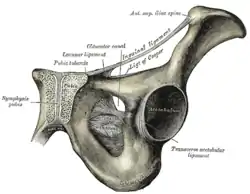Pectineal ligament
The pectineal ligament, sometimes known as the inguinal ligament of Cooper, is an extension of the lacunar ligament. It runs on the pectineal line of the pubic bone. The pectineal ligament is the posterior border of the femoral ring.
| Pectineal ligament | |
|---|---|
 The inguinal and lacunar ligaments. | |
| Details | |
| From | lacunar ligament |
| To | pectineal line |
| Identifiers | |
| Latin | ligamentum pectineum |
| TA98 | A04.5.01.011 |
| TA2 | 2367 |
| FMA | 20188 |
| Anatomical terminology | |
Clinical significance
The pectineal ligament is strong, and holds suture well. This facilitates reconstruction of the floor of the inguinal canal. A variant of non-prosthetic inguinal hernia repair, first used by Georg Lotheissen in Austria, now bears his name.
History
The pectineal ligament was characterized by Astley Cooper in 1804.[1][2]
References
- Faure JP, Hauet T, Scepi M, Chansigaud JP, Kamina P, Richer JP (2001). "The pectineal ligament: anatomical study and surgical applications". Surg Radiol Anat. 23 (4): 237–42. doi:10.1007/s00276-001-0237-1. PMID 11694967.
- Cooper, A. The Anatomy and Surgical Treatment of Internal and Congenital Hernia." London. 1804
External links
This article is issued from Wikipedia. The text is licensed under Creative Commons - Attribution - Sharealike. Additional terms may apply for the media files.